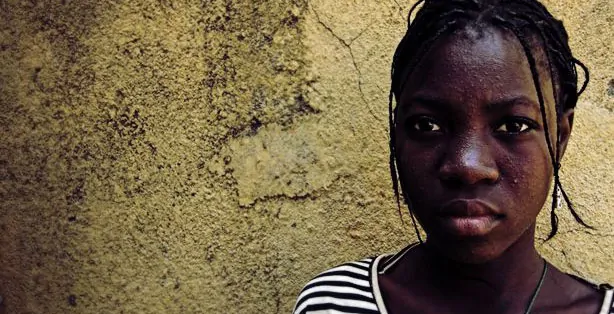
Around every corner in Timbuktu, Mali, we saw squatters’ dome-shaped tents, fashioned out of reed mats stitched together to create a little shade. And languishing everywhere were sand-covered young women and nearly naked boys and girls.
One tall man with a long beard, wearing a white robe and blue turban, seemed to be everywhere. He walked alongside a little girl we guessed to be about 10. We would round another corner, and there he and the girl were again. Later, as we talked with our African friend, Grace, we learned the likely fate of that little girl.
Grace, a stately and passionate local woman, is the leader of the Women’s Training Center in Timbuktu. She lovingly reaches out to girls like the one we kept seeing. The tall man, Grace told us, is a “religious leader.” Most likely he was making “arrangements.”
“The girl is probably a young virgin, being sold by her parents,” Grace told us. “A contract will be written up, perhaps even a ceremony performed. But almost certainly she will be divorced in a short while. And if she should become pregnant, she must bear the responsibility alone.
“Timbuktu is filled with hungry street children who came from such temporary marriages.”
The government is at long last recognizing the serious threats that result from this practice, including the HIV/AIDS epidemic raging through West Africa, Grace told us.
“These girls are just children. They should be playing and learning. Instead they are used as long-term prostitutes.” Then, with great tenderness and deep emotion, Grace added, “God has a plan for these girls, and yet people exploit their vulnerabilities in temporary marriages.”
There are three types of temporary marriage: work marriage, hidden marriage and tiny hut marriage.
In a work marriage, an Arab man from a country such as Libya or Morocco comes to Timbuktu for work and sees a girl he desires. Because he is wealthy and her family is impoverished, he negotiates a large dowry with her parents—often as high as 1 million francs or more (more than $3,000). The girl’s parents are honored that a wealthy man would choose their daughter. Religious contracts are signed, and within a day, a festive marriage ceremony is put together on the outskirts of town.
Everyone in our group had questions about how long such a marriage would last.
“That depends on the husband,” Grace told us. “It might be two weeks, two months, two years—whatever he wants. Generally it lasts only until his business dealings in Timbuktu come to an end.”
In a hidden marriage, or Sere Hiji, a man already has a wife or even two wives. Those wives will not tolerate an additional wife of low status. So the man chooses to keep the unacceptable girl hidden where he can “visit” her from time to time. Once the other wives find out about her, the marriage ends.
Our next question: “Why would a girl agree to such a marriage?”
“Money,” Grace says. “The dowry her family receives is far greater than they could ever hope to get from a traditional marriage.”
When asked how long this hidden marriage would last, Grace said: “As long as the girl remains ‘in good spirit, good behavior and in submission,’ or until his other wife finds out about her.”
A tiny hut marriage (Sneha) is for a man who is overtaken by his sexual desire while traveling. He wants to avoid adultery, so he simply asks to talk to the parents of any unmarried girl in the area, and he offers them a dowry in exchange for one or several nights with their daughter. The “marriage” will end at daybreak of the day he leaves. Though the bond was sealed by a religious proclamation, all he has to do is proclaim, “I divorce you, I divorce you, I divorce you,” and the marriage is over. The man goes home “guilt free.” The parents count their newfound wealth. The girl’s life is destroyed.
Halima’s parents married her to a stranger—he divorced her six days later. But he continued to visit from time to time and to bring food. Halima’s one hope was that he would continue to care for her.
“I felt such shame because I was no longer a virgin,” Halima told us. “Who would want to marry a girl like that?”
So deep is the disgrace after the marriage is over that some girls go right on selling themselves—much more cheaply since they are already used.
But for Halima, bigger problems lay ahead. She was pregnant. Still a young teen when she gave birth to her baby boy, she suffered with internal and external injuries and scarring. “The doctors told me I could not have any more children. … I suffer such pain that sometimes I want to die. But I have to stay alive for my baby. I am the only person who cares for him.”
“What about your baby’s father?” Michele asked. “Did he help you?”
“When he found out I could have no more children, he stopped coming to see us,” Halima said. “He also stopped making sure we had food.”
Halima learned from other girls that she could get food free at the Women’s Center. People at this cinder-block structure would also provide her with training so she could support herself and her son.
While Halima is in class, her son joins the many other children who pour into the new Noah’s Ark Day Center, built and funded by friends in the United States. Loving teachers teach the children reading, writing and math. The little ones receive a meal, and they can nap in a relatively cool building.
One thing we specifically wondered was whether or not Halima was learning about the love of God.
“The teacher is very good to me,” Halima said. “I like to learn. But I stopped praying to God a long time ago because of the hardness of my life. I have lost hope. Maybe someday my hope will come back to me.”
It is so for Salimata, one of the older women at the center. She, too, knows all about being weary and destitute. But, with hope radiating from her sun-leathered face, she told us, “I came here with such sadness and shame, but I found out that God loves me. I do my best to encourage the younger women until they too come to know God’s love.”
Then Salimata said: “These girls have been let down by so many people. They must not be let down here too.” At times women came to the end of their year of learning and practice only to find at their graduation that no sewing machine was available for them, Salimata explained. The center was set up to provide the training, not the expensive tools of the trade. Sewing machines were a bonus when the center could afford them.
“The cannot be!” Michele said. “We will do all we can to see that every single woman who works hard to learn will graduate with the tools she needs to build her new life.”
A group of businesswomen in the United States have joined us to see that commitment become a reality. Their business, Front Door Fabrics, gives a percentage of its sales for sewing machines and lessons in Timbuktu, and they ask for donations at the checkout counter as well.
What an opportunity to raise awareness of the plight of temporary wives by helping those who are rising above the abuse and exploitation!
Taken from Forgotten Girls: Stories of Hope and Courage by Kay Marshall Strom and Michele Rickett. Copyright(c) 2009 by Kay Marshall Strom and Michele Rickett. Used by permission of InterVarsity Press
PO Box 1400 Downers Grove, IL 60515. www.ivpress.com.





















